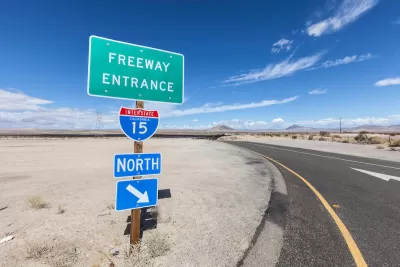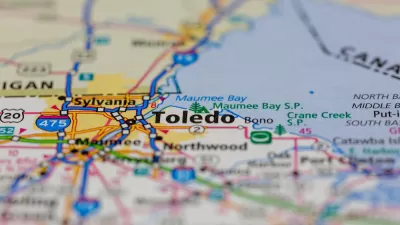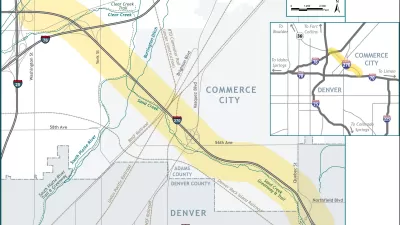The state Transportation Commission ultimately voted to move a controversial Inland Empire interstate project forward.

The California Transportation Commission approved a controversial freeway widening project, throwing into question the state’s purported commitment to its climate goals.
As Melanie Curry explains in Streetsblog California, the CTC delayed its decision on the Interstate 15 project in December, briefly giving opponents of freeway widening hope that the agency was rethinking its habit of approving projects with little question. “But most of the Commissioners made it clear they had no interest in revisiting the project, which would add ‘auxiliary lanes’ and express lanes on the I-15 in the Inland Empire, in an area where the number of warehouses has been expanding quickly, close to residential areas that have already seen a steady increase in truck traffic in the last few years.”
The project’s opponents say the expansion would contribute to worsened air quality, harming adjacent communities and causing more congestion and emissions. But during a contentious meeting, commissioners largely dismissed the concerns.
“In the end,” Curry writes, “the Commission quickly voted to approve the project, basically saying they had no choice but to approve something that had gotten this far along in the process. But that leaves the question: when is the right time to raise the concerns of residents and others worried about the climate and clean air?”
FULL STORY: CTC Approves Controversial I-15 Expansion, After All

Study: Maui’s Plan to Convert Vacation Rentals to Long-Term Housing Could Cause Nearly $1 Billion Economic Loss
The plan would reduce visitor accommodation by 25,% resulting in 1,900 jobs lost.

North Texas Transit Leaders Tout Benefits of TOD for Growing Region
At a summit focused on transit-oriented development, policymakers discussed how North Texas’ expanded light rail system can serve as a tool for economic growth.

Why Should We Subsidize Public Transportation?
Many public transit agencies face financial stress due to rising costs, declining fare revenue, and declining subsidies. Transit advocates must provide a strong business case for increasing public transit funding.

How Community Science Connects People, Parks, and Biodiversity
Community science engages people of all backgrounds in documenting local biodiversity, strengthening connections to nature, and contributing to global efforts like the City Nature Challenge to build a more inclusive and resilient future.

Alabama: Trump Terminates Settlements for Black Communities Harmed By Raw Sewage
Trump deemed the landmark civil rights agreement “illegal DEI and environmental justice policy.”

Dear Tesla Driver: “It’s not You, It’s Him.”
Amidst a booming bumper sticker industry, one writer offers solace to those asking, “Does this car make me look fascist?”
Urban Design for Planners 1: Software Tools
This six-course series explores essential urban design concepts using open source software and equips planners with the tools they need to participate fully in the urban design process.
Planning for Universal Design
Learn the tools for implementing Universal Design in planning regulations.
City of Santa Clarita
Ascent Environmental
Institute for Housing and Urban Development Studies (IHS)
City of Grandview
Harvard GSD Executive Education
Toledo-Lucas County Plan Commissions
Salt Lake City
NYU Wagner Graduate School of Public Service





























